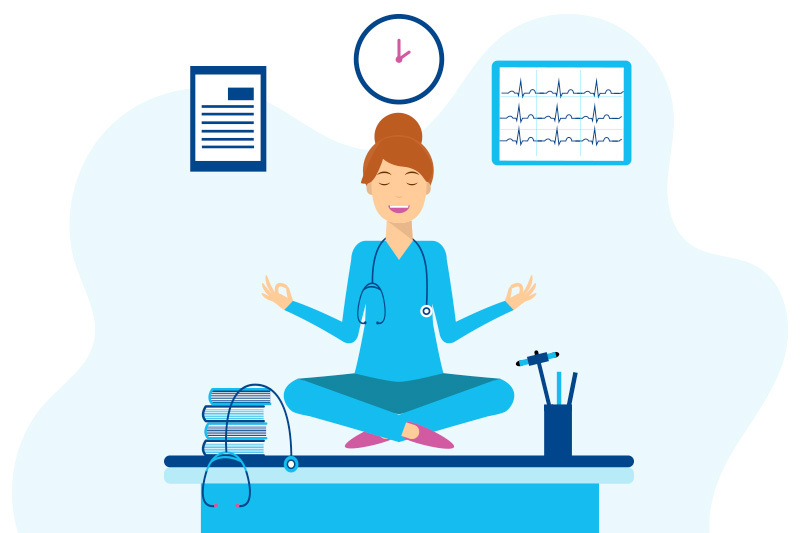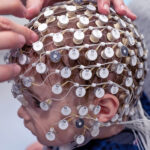Tapping into the mind-body connection to reduce COVID-19 stress

In a dimly lit living room, a staff member lies on a couch, eyes closed, as soft music floats through the air. From a nearby computer screen, the voice of Victoria Klumpp, RN, BSN, IBCLC, comes over a Zoom link as she talks the person through a Reiki session.
Klumpp, who is clinical coordinator of the Family Wellness Program with the Hale Family Center for Families at Boston Children’s Hospital, is physically located about 30 miles away from the client. Yet she is able to perform Reiki, a form of energy work, remotely to provide calm and restoration.
Putting Reiki to work
The mission of the Family Wellness Program is to support patients and caregivers. Therefore, the program holds in-person Reiki sessions throughout the hospital for these family members. In recent years, employees have also taken advantage of some of the services offered. Now, with the increase in stress during the COVID-19 pandemic, treatments such as Reiki are increasingly popular among staff — and many of them report feeling significant improvements.
“Reiki is a practice of healing that originated in Japan,” Klumpp says. “It is an easy way to provide people with a respite from the demands of their day and enables them to calm their body and let go to experience a change of state.”
Specifically, Reiki involves the practitioner facilitating healing to help the mind and body enter a state of greater relaxation. In person, Klumpp performs this process by placing her hands lightly on, or above, the client’s body. Remotely, she uses her intention and visualization instead of her touch to achieve similar results.
Data Klumpp has gathered over the past years reveals that all of the participants who received Reiki from her reported reductions in their stress levels. She also uses Reiki to help employees dealing with depression, pain, and other health issues.
Reiki is just one of several of the mind-body offerings at Boston Children’s that can help clinicians and other staff members cope with stress during this time of great uncertainty and anxiety.
The power of mindfulness
Mindfulness is another such technique that was already taught to patients and employees at Boston Children’s. Now, it is available in a remote format to help health care providers and employees move through the current situation with more ease.
“Many people are juggling on-the-job challenges while also supporting their own children, and caring for their aging parents who are at increased risk for COVID-19 complications,” explains Ariel Botta, PhD, MSW, LICSW, who created a mindfulness program for providers at Boston Children’s about a year ago.
Coping with COVID-19 stress
The practice of mindfulness encourages people to live more fully in the present moment, on purpose, and without judgment. Studies show that it can help people to find a better work-life balance, as well as reduce burnout, compassion fatigue, anxiety, and routine stress. In a study Botta conducted at Boston Children’s with health care employees from nine different disciplines, there was a statistically significant reduction in stress and emotional exhaustion (a key component of burnout), and an increase in mindfulness following a single day of mindfulness training offered in the workplace.
“We can’t control the things that have already happened and we can’t predict what will continue to happen in COVID-19, but through mindfulness, we can take care of ourselves and each other,” Botta says.
“Research shows that focusing on a positive thought, experience, or interaction for 20 to 30 seconds a day can increase optimism. This is a simple but powerful practice that can actually rewire the brain to focus more on positive experiences than negative ones,” she says. For people who find it difficult to dedicate time during the day to do this, she recommends trying the practice right before bed.
Other mind-body approaches
Other efforts that help clinicians, nurses, and staff tap into the mind-body connection at Boston Children’s include music groups, yoga classes, and writing workshops. All of these provide a safe avenue for people to connect with their feelings and process them in a group setting, thus reducing the effects of stress and improving their mental health in the process. An added benefit to bringing people together is that it allows them to see they are not alone in their feelings and don’t have to feel so overwhelmed.
Tips for your practice
For other organizations looking to help address COVID-19 stress and frustrations, Klumpp and Botta offer these tips:
- Find creative ways to bring your employees and clinicians together to talk about pressing issues and share advice and ideas.
- Make programs addressing the mind-body connection, such as Reiki and mindfulness, easy for people to access.
- Consider offering trainings that provide continuing education credits so people can get professional, as well as personal, benefits.
- Prioritize the importance of self-care for employees. By encouraging people to make time to take care of themselves, they will perform better at work, too.
- Remind people that they are not alone. Everyone is going through a difficult time and we can all get through it together.
Learn more about how we support providers during COVID-19 and access timely clinician resources.
Related Posts :
-

EEG markers in early life could help predict and diagnose anxiety
Anxiety disorders are the most common mental health problem among children and adolescents and are a risk factor for adult ...
-

MIS-C’s long-term effects on mental and neurologic health
Children and adolescents who have had multisystem inflammatory syndrome in children (MIS-C) after exposure to COVID-19 are recommended to have ...
-

Social and emotional health in high school
Sarauna Moore has a unique perspective on students’ emotional and behavioral health. As part of the Boston Children’s Hospital ...
-

New Year’s resolutions and kids: what to know
With a new year upon us, we’re once again bombarded with messages about getting healthier, skinnier, and more disciplined ...





